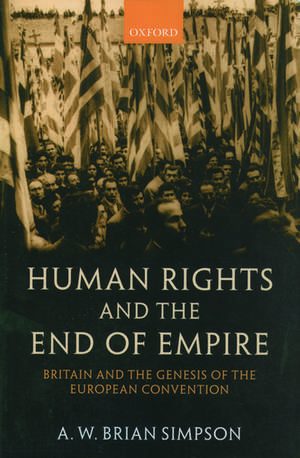Human Rights and the End of Empire: Britain and the Genesis of the European Convention
Autor A. W Brian Simpsonen Limba Engleză Paperback – 29 ian 2004
Preț: 691.97 lei
Preț vechi: 984.85 lei
-30% Nou
Puncte Express: 1038
Preț estimativ în valută:
132.41€ • 141.59$ • 110.40£
132.41€ • 141.59$ • 110.40£
Carte tipărită la comandă
Livrare economică 07-14 aprilie
Preluare comenzi: 021 569.72.76
Specificații
ISBN-13: 9780199267897
ISBN-10: 0199267898
Pagini: 1178
Dimensiuni: 156 x 232 x 54 mm
Greutate: 1.66 kg
Editura: OUP OXFORD
Colecția OUP Oxford
Locul publicării:Oxford, United Kingdom
ISBN-10: 0199267898
Pagini: 1178
Dimensiuni: 156 x 232 x 54 mm
Greutate: 1.66 kg
Editura: OUP OXFORD
Colecția OUP Oxford
Locul publicării:Oxford, United Kingdom
Recenzii
Human Rights and the End of Empire is full of good things. It is well written, with numerous interesting (and provoking) asides and pen portraits of the dramatis personae. It provides an unrivalled narrative of the origins of the Convention and of British official attitudes to human rights in the immediate post-war years, and will be an invaluable aid to anyone wishing to understand the evolution of the European system of human rights protection.
This is a major book by a master of legal history.
a very well written book, based on meticulous scholarship, with a convincing argument, and on a theme of great interest and importance, especially since September 11th.
This is a major book by a master of legal history.
a very well written book, based on meticulous scholarship, with a convincing argument, and on a theme of great interest and importance, especially since September 11th.
Notă biografică
A. W. Brian Simpson is Charles F. and Edith J. Clyne Professor of Law at the University of Michigan Law School.












